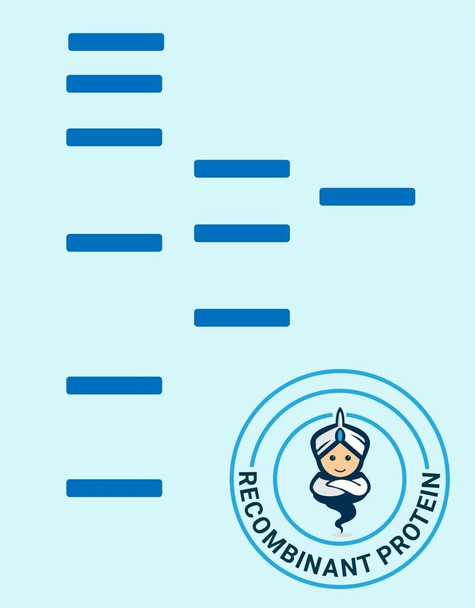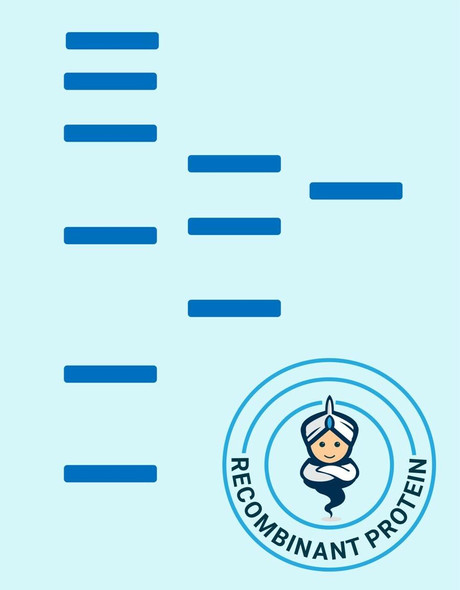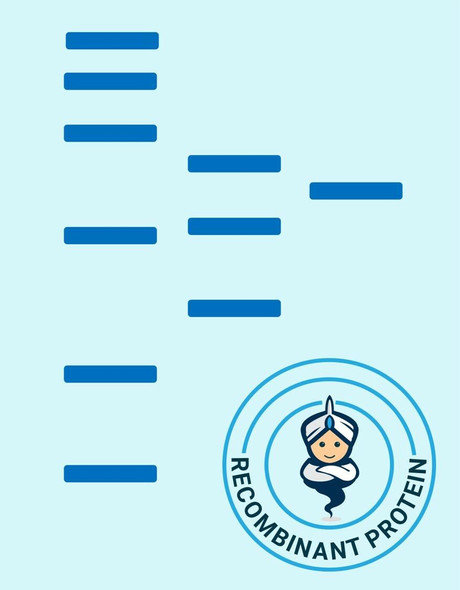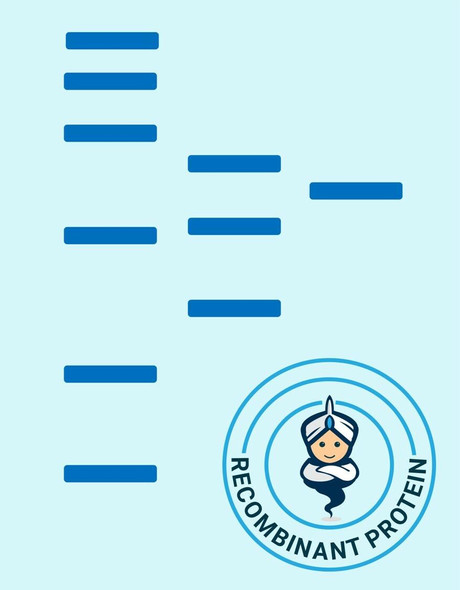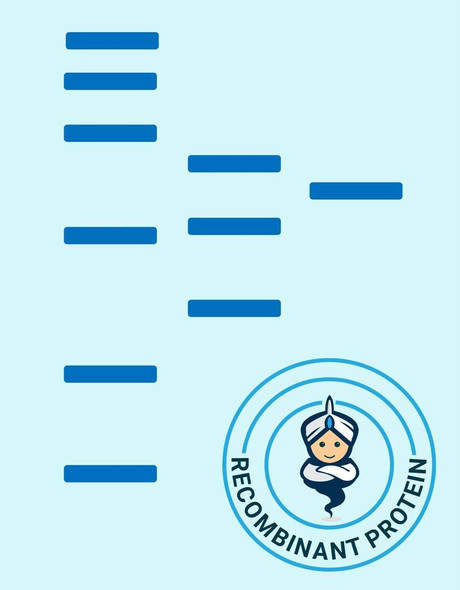Human SAT1 Recombinant Protein (RPPB2263)
- SKU:
- RPPB2263
- Product type:
- Recombinant Protein
- Size:
- 20ug
- Species:
- Human
- Target:
- SAT1
- Synonyms:
- Diamine acetyltransferase 1
- Spermidine/spermine N(1)-acetyltransferase 1
- Putrescine acetyltransferase
- Polyamine N-acetyltransferase 1
- Source:
- Escherichia Coli
- Uniprot:
- P21673
Description
| Product Name: | Human SAT1 Recombinant Protein |
| Product Code: | RPPB2263 |
| Size: | 20µg |
| Species: | Human |
| Target: | SAT1 |
| Synonyms: | Diamine acetyltransferase 1, Spermidine/spermine N(1)-acetyltransferase 1, Putrescine acetyltransferase, Polyamine N-acetyltransferase 1, SSAT-1, SSAT, SAT1, SAT, DC21, KFSD, KFSDX. |
| Source: | Escherichia Coli |
| Physical Appearance: | Sterile Filtered colorless solution. |
| Formulation: | The SAT1 solution contains 20mM Tris-HCl buffer (pH8.0) and 10% glycerol. |
| Stability: | Store at 4°C if entire vial will be used within 2-4 weeks. Store, frozen at -20°C for longer periods of time. For long term storage it is recommended to add a carrier protein (0.1% HSA or BSA).Avoid multiple freeze-thaw cycles. |
| Purity: | Greater than 95.0% as determined by SDS-PAGE. |
| Amino Acid Sequence: | MGSSHHHHHH SSGLVPRGSH MAKFVIRPAT AADCSDILRL IKELAKYEYM EEQVILTEKD LLEDGFGEHP FYHCLVAEVP KEHWTPEGHS IVGFAMYYFT YDPWIGKLLY LEDFFVMSDY RGFGIGSEIL KNLSQVAMRC RCSSMHFLVA EWNEPSINFY KRRGASDLSS EEGWRLFKID KEYLLKMATE E |
SAT-1 is a member the acetyltransferase family, and is a rate-limiting enzyme in the catabolic pathway of polyamine metabolism. SAT1 catalyzes the acetylation of spermidine and spermine, and is involved in the regulation of the intracellular concentration of polyamines and their transport out of cells. Therefore, SAT-1’s role is essential in polyamine homoeostasis, given that acetylated products are either excreted from the cell or oxidized by acetylpolyamine oxidase. Increased SAT1 activity causes variety of other effects which include pancreatic cells death, obstruction of regenerative tissue growth, behavioral changes, keratosis follicularis spinulosa decalvans (KFSD), and hair loss.Defects in the SAT1 gene are linked to KFSD (keratosis follicularis spinulosa decalvans), which is a rare X-linked disorder affecting the skin and the eye. The KFSD affected men show thickening of the skin of the neck, ears, and extremities, particularly the palms and soles, loss of eyebrows, eyelashes and beard, thickening of the eyelids with blepharitis and ectropion, and corneal degeneration. Even though the majority of the affected families are compatible with an X-linked inheritance, KFSD are found to be clinically and genetically heterogeneous.
SAT1 Human Recombinant fused with a 20 amino acid His tag at N-terminus produced in E.Coli is a single, non-glycosylated, polypeptide chain containing 191 amino acids (1-171 a.a.) and having a molecular mass of 22.1kDa.The SAT1 is purified by proprietary chromatographic techniques.
| UniProt Protein Function: | SAT: Enzyme which catalyzes the acetylation of polyamines. Substrate specificity: norspermidine = spermidine >> spermine > N(1)-acetylspermine > putrescine. This highly regulated enzyme allows a fine attenuation of the intracellular concentration of polyamines. Also involved in the regulation of polyamine transport out of cells. Acts on 1,3-diaminopropane, 1,5-diaminopentane, putrescine, spermidine (forming N(1)- and N(8)-acetylspermidine), spermine, N(1)-acetylspermidine and N(8)-acetylspermidine. Defects in SAT1 may be a cause of keratosis follicularis spinulosa decalvans X-linked (KFSDX). A rare disorder affecting the skin and the eye. Affected men show thickening of the skin of the neck, ears, and extremities, especially the palms and soles, loss of eyebrows, eyelashes and beard, thickening of the eyelids with blepharitis and ectropion, and corneal degeneration. Belongs to the acetyltransferase family. |
| UniProt Protein Details: | Protein type:Amino Acid Metabolism - arginine and proline; EC 2.3.1.57; Acetyltransferase Chromosomal Location of Human Ortholog: Xp22.1 Cellular Component: intracellular; cytosol Molecular Function:protein binding; diamine N-acetyltransferase activity; spermidine binding Biological Process: spermidine acetylation; polyamine biosynthetic process; angiogenesis; putrescine catabolic process; polyamine metabolic process; regulation of cell proliferation Disease: Keratosis Follicularis Spinulosa Decalvans, X-linked |
| NCBI Summary: | The protein encoded by this gene belongs to the acetyltransferase family, and is a rate-limiting enzyme in the catabolic pathway of polyamine metabolism. It catalyzes the acetylation of spermidine and spermine, and is involved in the regulation of the intracellular concentration of polyamines and their transport out of cells. Defects in this gene are associated with keratosis follicularis spinulosa decalvans (KFSD). Alternatively spliced transcripts have been found for this gene.[provided by RefSeq, Sep 2009] |
| UniProt Code: | P21673 |
| NCBI GenInfo Identifier: | 114322 |
| NCBI Gene ID: | 6303 |
| NCBI Accession: | P21673.1 |
| UniProt Related Accession: | P21673 |
| Molecular Weight: | 171 |
| NCBI Full Name: | Diamine acetyltransferase 1 |
| NCBI Synonym Full Names: | spermidine/spermine N1-acetyltransferase 1 |
| NCBI Official Symbol: | SAT1 |
| NCBI Official Synonym Symbols: | SAT; DC21; KFSD; SSAT; KFSDX; SSAT-1 |
| NCBI Protein Information: | diamine acetyltransferase 1; putrescine acetyltransferase; diamine N-acetyltransferase 1; polyamine N-acetyltransferase 1; spermidine/spermine N1-acetyltransferase alpha |
| UniProt Protein Name: | Diamine acetyltransferase 1 |
| UniProt Synonym Protein Names: | Polyamine N-acetyltransferase 1; Putrescine acetyltransferase; Spermidine/spermine N(1)-acetyltransferase 1; SSAT; SSAT-1 |
| Protein Family: | Serine acetyltransferase |
| UniProt Gene Name: | SAT1 |
| UniProt Entry Name: | SAT1_HUMAN |

